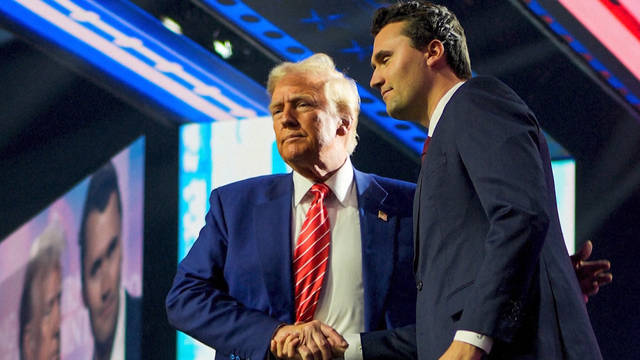
Topics
By Amy Goodman & Denis Moynihan
The assassination of conservative activist Charlie Kirk in Utah on Wednesday sent shockwaves across the country and around the world, not only through its raw violence, with a single, deadly sniper shot, but as a hallmark of worsening political divisions wracking the United States. President Donald Trump could and should use his enormous platform to calm tempers. Instead, he immediately blamed, without evidence, the “radical left” for Kirk’s murder. This came just days after Trump threatened war against Chicago and while he’s assembling a paramilitary force for domestic deployment against citizens, immigrants, and anyone else he cares to target.
Trump has been threatening for weeks to deploy the National Guard to Chicago. On September 5th, Trump renamed the Pentagon the “Department of War.” He had no authority to do so – only Congress can – so his order specifies “Department of War” as a “secondary title” and instructs the executive branch to use the name. Sporting his new title “Secretary of War” Pete Hegseth announced in the Oval Office, “We’re going to go on offence, not just on defence. Maximum lethality, not tepid legality. Violent effect, not politically correct.”
Trump then issued a disturbing post on his Truth Social platform, declaring, “Chicago about to find out why it’s called the Department of WAR,” along with the phrase, “I love the smell of deportations in the morning…”
The post included an image of Trump in a US Army cavalry officer’s uniform, squatting before a smoke and flame-engulfed Chicago skyline, with the phrase, “Chipocalypse Now.” The image was based on a scene from the 1979 Vietnam war film, “Apocalypse Now,” in which Lt. Col. Kilgore, played by Robert Duvall, massacred a Vietnamese village so he and his troops could safely surf on a nearby beach. Kilgore says, “I love the smell of napalm in the morning.”
Trump had already recently deployed troops without reason, request by state or local authorities, or legal justification in Los Angeles. This, from the president desperate to win a Nobel Peace Prize. A federal judge in California has already ruled this was a violation of the 1878 Posse Comitatus Act, prohibiting the use of the military in domestic law enforcement except in limited cases like insurrection.
“Trump has always wanted his own muscle,” investigative reporter Radley Balko said on the Democracy Now! news hour. “He’s always expressed envy for dictators and authoritarians overseas who have forces that they can deploy to do their own personal bidding, whether it’s putting down protests or going after political opponents,” Radley Balko wrote the book, “Rise of the Warrior Cop: The Militarization of America’s Police Forces.”
Trump also recently ordered the launch of an online portal to recruit “Americans with law enforcement or other relevant backgrounds and experience to apply to join Federal law enforcement” in policing Washington, DC. In other words, he wants to recruit and deputize vigilantes.
Balko also noted how the “unlimited budget that Congress has given Trump to hire ICE and Border Patrol agents is going to allow them to really build out those forces. It would be one of the largest militaries in the world if ICE itself were a military. They’re going to staff it with people who are primarily loyal to Trump and who aren’t going to be questioning unconstitutional orders. He’s trying to fulfill this vision of his own personal paramilitary force in multiple different ways.”
Which brings us back to Trump’s disturbing reference to “Apocalypse Now.” While the comparison to the callous, violent Lt. Col. Kilgore might be valid, a more appropriate comparison would be to the film’s chief antagonist, Col. Kurtz, played by Marlon Brando. In the film, Kurtz abandons his command and retreats deep into the jungle, to control his own fiefdom and a military force of native Vietnamese, who seem to revere him as a demigod. Kurtz seems convinced of his own infallibility, and rejects any authority or bounds on his power.
The film is based on Joseph Conrad’s 1899 novella, “Heart of Darkness,” set in the Belgian Congo. In it, another Kurtz goes rogue, assuming local power, amidst the rampant violence of colonialism and resource extraction.
Political violence has no place in society, and must be rejected by everyone, on all sides of any debate. This includes the targeted assassinations of political foes, as happened with the assassination of Minnesota’s former Democratic house speaker Melissa Hortman and her husband in June, or the assassination this week of Charlie Kirk.
Likewise, Trump’s constant threats of violence against entire cities, against marginalized communities, or against individuals he deems his political enemies, must also be rejected and resisted, relentlessly.

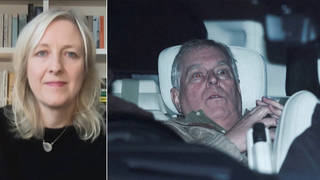
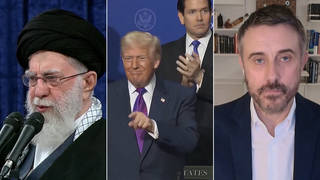

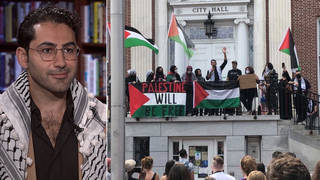





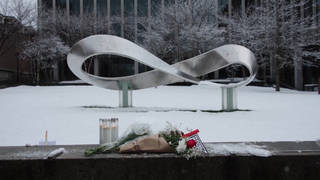

Media Options